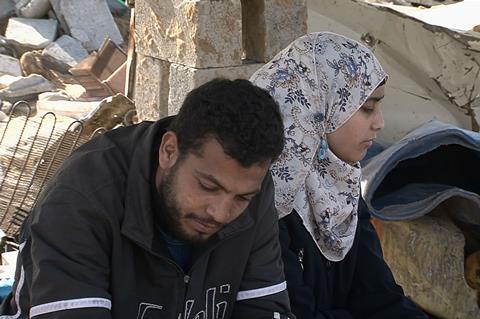Documentary about the normal Palestinian family torn at the heart of the ‘Zeitoun incident’

Dir: Stefano Savona. France-Italy. 2018. 132mins
“I don’t know how to tell a story”, says teenage girl Amal Samouni at the beginning of this powerful documentary about a Palestinian family torn apart by war. Luckily, Italian director Stefano Savona is there to help – though it will emerge in the course of his thoughtful, part-animated film that Amal, Samouni Road’s personal centre of gravity, is a perfectly capable weaver of memories herself, given the right stimulus. The tragedy at the centre of the film is the notorious ‘Zeitoun Incident’ of January 2009, when a total of 48 civilians were killed during the course of an Israeli military operation in a previously peaceful, rural district of Gaza City, among them 29 members of the same Samouni family.
The clear intent here is to go beyond the emergency view of the Arab-Israeli conflict
Recounted through a mix of scratchy black-and-white animation with a linocut feel (courtesy of artist-animator Simone Massi) and reconstructed drone imagery, it’s the 30-minute long reconstruction of the massacre itself, with its clanging, metallic score halfway between music and sound design, that lends the film its considerable emotional impact. Yet it’s what takes place either side side of this dramatic core that makes Savona’s sensitive film stand out. The clear intent here is to go beyond the emergency view of the Arab-Israeli conflict that we absorb through our TV news screens and social media feeds, in order simply to spend time with an ordinary Palestinian family attempting to piece together its life after a terrible trauma.
At first we struggle to find a thematic backbone to a series of scenes that show the surviving members of the Samouni family going about their daily lives in a battered suburb that nevertheless clings on to a few remnants of fertile farmland, including the family’s decimated olive grove. Gradually, though, it becomes clear that the film is partly about the deeply human tension between the need to preserve and order omemories of the past, and the need to move on with life.
Memories blossom into brief animated sequences, but they’re fragile things. The words of old songs they used to sing in the fields are already slipping away from the Samounis, drowned out by the swagger of the Bollywood melodramas they watch on television. Amal, who was left for dead for three days after the Israeli rocket strike that killed her father and several other family members, has several fragments of shrapnel still embedded in her brain. Yet she’s a radiant, resourceful girl whose battle against her brothers’ attempts to exclude her from their important male business is a powerful strand of a film that does not flinch from the less than illuminated aspects of life in this intensely tight-knit, judgmental, patriarchal society.
In the film’s final section, the fissures as well as the healing currents of the aftermath are highlighted in the edit of the handheld footage Savona shot during several visits to the family. We see how the dead – though, tellingly, only the males – have become no longer victims but ‘martyrs’. We see fights break out over land distribution when the residents of the Zeitoun district are finally allowed to return to their devastated homes, and watch, with his worried mother, as Amal’s younger brother nurses jihadist dreams of revenge.
And we see Hamas, Fatah and other political and religious players trying to use the Samounis for their own power games. But there’s hope too, in the wedding that closes this nuanced documentary, and in the resilience of the family at its centre.
Production companies: Picofilms, Dugong Films, Alter Ego Production, Arte France Cinéma, Rai Cinema
International sales: Doc & Films International, sales@docandfilm.com
Producers: Penelope Bortoluzzi, Marco Alessi, Cécile Lestrade
Screenplay: Stefano Savona, Léa Mysius, Penelope Bortoluzzi
Animation director: Simone Massi
Editing: Luc Forveille
Cinematography: Stefano Savona
Music: Giulia Tagliavia















![[L-R]: Amanda Villavieja, Laia Casanovas, Yasmina Praderas](https://d1nslcd7m2225b.cloudfront.net/Pictures/274x183/6/4/1/1471641_pxl_20251224_103354743_618426_crop.jpg)








